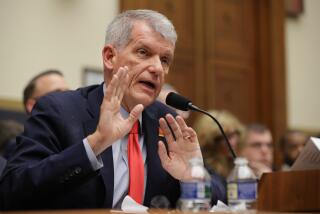Witness Says He Caught Spiegel With $7 Million : Trial: The former general counsel of the now-defunct thrift testifies the chief executive went ‘ballistic’ when confronted.
- Share via
In the most damaging testimony yet in the week-old trial of former Columbia Savings & Loan boss Thomas Spiegel, the former general counsel of the now-defunct financial institution testified Friday that Spiegel tried to keep $7 million in profits that rightly belonged to Columbia and became enraged when confronted with evidence of the alleged deception.
Kenneth Heitz, who was hired as Columbia’s general counsel in 1988, also said Spiegel threatened him when he asked Spiegel to return some guns the banker took from Columbia’s headquarters in Beverly Hills.
For the record:
12:00 a.m. Dec. 8, 1994 For the Record
Los Angeles Times Thursday December 8, 1994 Home Edition Business Part D Page 2 Column 5 Financial Desk 7 inches; 233 words Type of Material: Correction
Thomas Spiegel--An Oct. 29 story in The Times inaccurately reported the court testimony of Kenneth Heitz in the fraud trial of Thomas Spiegel, former chief executive of now defunct Columbia Savings & Loan in Beverly Hills.
The story reported that Heitz, Columbia’s former general counsel, testified that Spiegel tried to keep $7 million in profits that rightly belonged to Columbia. The story reported that Spiegel had not disclosed his investment in Storer Communications warrants to Columbia’s directors and went “ballistic” when Heitz confronted him with evidence of the alleged deception.
In fact, the news story confused the events of two separate meetings. According to court transcripts:
In 1988, Heitz recommended that Spiegel transfer his personal profits from stock warrants in Storer Communications to Columbia Savings because Spiegel had not gotten approval for the investment from Columbia’s full board of directors. Heitz said that Spiegel complied with his request professionally--without emotion or argument--shortly after consulting his personal attorney.
Then, in a separate meeting in 1989, Heitz said that he showed a prospectus for the Storer warrants to Spiegel and a colleague, David Sachs, that had been prepared by Drexel Burnham Lambert and Kohlberg, Kravis, Roberts & Co.
It was at that meeting, Heitz testified, that both Spiegel and Sachs went “ballistic,” in part because they had not known the document existed. They were also angry because investors such as Columbia Savings, which was a major investor in Storer securities, should have been given the opportunity to invest in the valued warrants by Drexel, Heitz said.
Heitz’s testimony shed new light on many of the 45 criminal charges that the U.S. attorney’s office has filed against Spiegel, who the government claims used his power as the thrift’s chief executive to enrich himself.
Spiegel resigned at the end of 1989, and the institution was seized by regulators in early 1991. The failure is expected to cost taxpayers about $1.3 billion, making it the third-costliest thrift bailout in history.
Much of Heitz’s testimony Friday revolved around Spiegel’s $132,000 investment in special warrants that that were created when the investment firm of Kohlberg, Kravis, Roberts & Co. purchased Storer Communications in 1985.
Columbia purchased about $86 million in junk bonds needed to finance the sale through Drexel Burnham Lambert and its junk bond king, Michael Milken, a close friend of Spiegel’s who later pleaded guilty to securities fraud.
After the deal was completed, Heitz said, he learned that Spiegel had secretly invested $132,000 in potentially lucrative warrants for Storer stock. Though Spiegel invested his own money, Heitz said Columbia--not Spiegel--should have had the opportunity to buy the warrants as its bonus for putting $86 million into the transaction.
Spiegel also never told Columbia’s board about the existence of the warrants, Heitz said. When the attorney discovered a prospectus for the offering and confronted Spiegel with it, Heitz said, the banker flew into a rage.
“ ‘Ballistic’ ” would probably be a good description,” Heitz testified, adding that the value of the warrants had by then climbed to about $7 million.
Heitz said he asked Spiegel to transfer the warrants to Columbia and that Spiegel complied shortly after conferring with his personal attorney.
Heitz also testified that when Spiegel was pushing for a series of multimillion-dollar loans and renewals for a friend of his, auto dealer Howard Schneider, Spiegel objected to the lawyer’s request for a background check of Schneider and his finances.
The prosecution maintains that Spiegel wanted Schneider to get the loans so the banker could continue driving Schneider’s luxury cars for free, and because Spiegel eventually hoped to gain a half-interest in the dealership by using Columbia’s money instead of his own.
The government alleges that Columbia lost more than $10 million when Schneider eventually defaulted. The auto dealer has since pleaded guilty to two counts of defrauding Columbia and is expected to testify against Spiegel next month.
John F. Walsh, the government’s lead prosecutor, also asked Heitz to recount his efforts to recover several Columbia-owned firearms Spiegel had taken to his home after he resigned in 1989. Spiegel has said he needed the guns at the headquarters for security reasons.
Heitz said that when he asked Spiegel to give the guns back in early 1990, Spiegel once again grew angry and threatened him. Walsh’s efforts to have Heitz describe the threat were halted after Spiegel’s attorney objected to the question.
More to Read
Inside the business of entertainment
The Wide Shot brings you news, analysis and insights on everything from streaming wars to production — and what it all means for the future.
You may occasionally receive promotional content from the Los Angeles Times.










